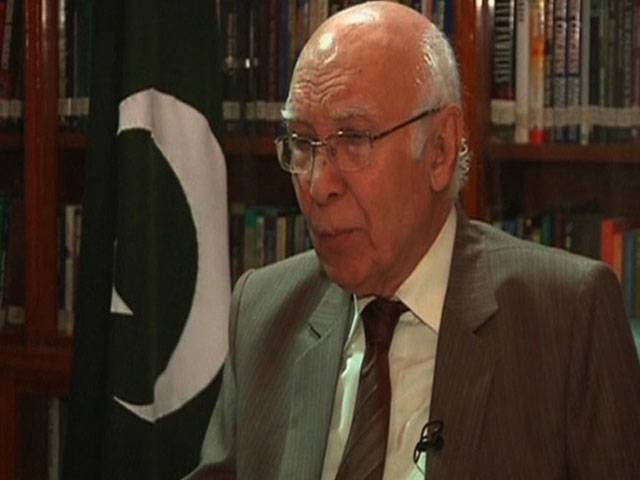ISLAMABAD - Advisor to Prime Minister on National Security and Foreign Affairs Sartaj Aziz Wednesday said that Islamabad has been protesting against the drone attacks at all levels as these are un-productive and violate Pakistan’s sovereignty.
Talking to newsmen after addressing a book launching ceremony here at Islamabad Institute of Strategic Study, he said that Pakistan has got the support from international community on its stance on the drone attacks. He said a resolution by the United Nations General Assembly has also been adopted to condemn the drone attacks, that reflects the international public opinion and also speaks of legality and illegality of the use of drones.
Reiterating Pakistan’s position on the drone attacks, he said, “We’ll continue to protest against these drone attacks at all levels.”
He said although these drone attacks have achieved the results according to United States that high value targets have been killed in these strikes; therefore, now these drone attacks should be stopped.
He said the next move by Pakistan will be to approach the United Nations Human Rights Commission in Geneva against drone attacks and make efforts for adoption of similar resolution there. He said Pakistan will continue to build international opinion against drone attacks.
Sartaj Aziz said that the government is using force against those elements who are challenging writ of the state in the tribal areas.
Replying to a question, he said the use of force by former President Pervez Musharraf damaged the tribal culture and made difficult for the government to resolve the issue of militants in the region.
The Advisor said the war on terror in the last more than ten years have achieved less and caused more damage especially in Pakistan and Afghanistan. He said due to war against terror, the local public in these areas have become against the government and some criminal elements have intruded in the area to exploit the situation.
Replying to a question on the progress of negotiations with Taliban, Aziz said some contacts have been established in this connection but refused to elaborate further on the development of these talks. He said besides starting negotiations with the Taliban, the government, initiating development projects in the tribal areas, has decided to strengthen the border areas to stop illegal movement of the people across the border. He said in seven of the eight tribal agencies, the government has established its writ and was making efforts to establish its writ in the 8th agency.
Earlier, addressing the function to launch the book, “The Thistle and the Drone: How America’s War on Terror Became a Global War on Tribal Islam” written by renowned writer Akbar Ahmad, Aziz said tribal culture and ethics should be ensured to have peace and security in these areas.
Appreciating the efforts of Akbar Ahmed for writing a comprehensive book on the issue of war against terror and tribal culture, he agreed that the war had destroyed the tribal culture. He said that the use of drones against tribal people is paradoxical. He said that in dissecting the conflict, the analogy of thistle and the drones is very revealing. He said that America is fighting the wrong war with wrong methods against the wrong people.
ISSI chairman, Ambassador Khalid Mehmood speaking on the occasion said that ethnicity and tribal identity is a crucial factor to terrorism. He believed that the government needs to develop strong counter narrative to the people of the tribal area. He said it is important to understand the aspiration and grievances of the people of the tribal area. He said use of drones which are also inflicting havoc on innocent civilians is not merely a question of legality and constitutionally.
Earlier, ISSI Director General, Dr Rasul Bakhsh Rais in his welcome remarks said that Professor Akbar Ahmad is one of the few Pakistanis who have attained international recognition.
Professor Akbar S. Ahmed addressing on this occasion said the drone became a symbol of America’s war on terror. He said its main targets appeared to be Muslim tribal groups belonging to Afghanistan, Pakistan, Yemen, Somalia, on Kurds in Turkey and Tausug in the Philippines. He said that drones are also used by the US against the Pukhtun tribes of Afghanistan, by France in northern Mali against the Tuareg, and by Israel in Gaza.
Professor Ahmed said that these communities – some of the most impoverished and isolated in the world, with identities that are centuries old – had become the targets of the 21 centuries most advanced kill technology. He said that drone embodied the weaponry of globalisation: high tech in performance, sleek in appearance and global in reach.
Professor Ahmad briefly talked about tribal societies and focused on four major groups: the Pukhtun, Yemenis, Somalis and Kurds.
He said three strong pillars essential for the stability of the culture including tribal elders, mullah, and political agent have been destroyed in the tribal areas that has disturbed the law and order situation. He said basic rights of the people living in tribal areas had to be ensured to improve the situation.
Friday, April 26, 2024
US fighting ‘wrong war’: Sartaj
Says Pakistan to continue protesting against drone strikes

Vloggers Shiraz, Muskan cross 2m followers on Instagram
12:27 AM | April 26, 2024
Achakzai stresses collective wisdom to address country's crises
12:27 AM | April 26, 2024
IHC puts off cipher case hearing until April 30
12:26 AM | April 26, 2024
Nawaz Sharif convenes PML-N Punjab meeting tomorrow
12:25 AM | April 26, 2024
ECP reinstates PTI-backed MNA from NA-81 Gujranwala
12:24 AM | April 26, 2024
Academic Uprising
April 24, 2024
Cooperation Momentum
April 24, 2024
Facing Reality
April 24, 2024
Absent Academia
April 23, 2024
Murree’s Redemption
April 23, 2024
Ending animal suffering
April 25, 2024
AI governance
April 25, 2024
AI concerns
April 25, 2024
Population paradox
April 24, 2024
Unveiling differences
April 24, 2024
ePaper - Nawaiwaqt
Advertisement
Nawaiwaqt Group | Copyright © 2024





